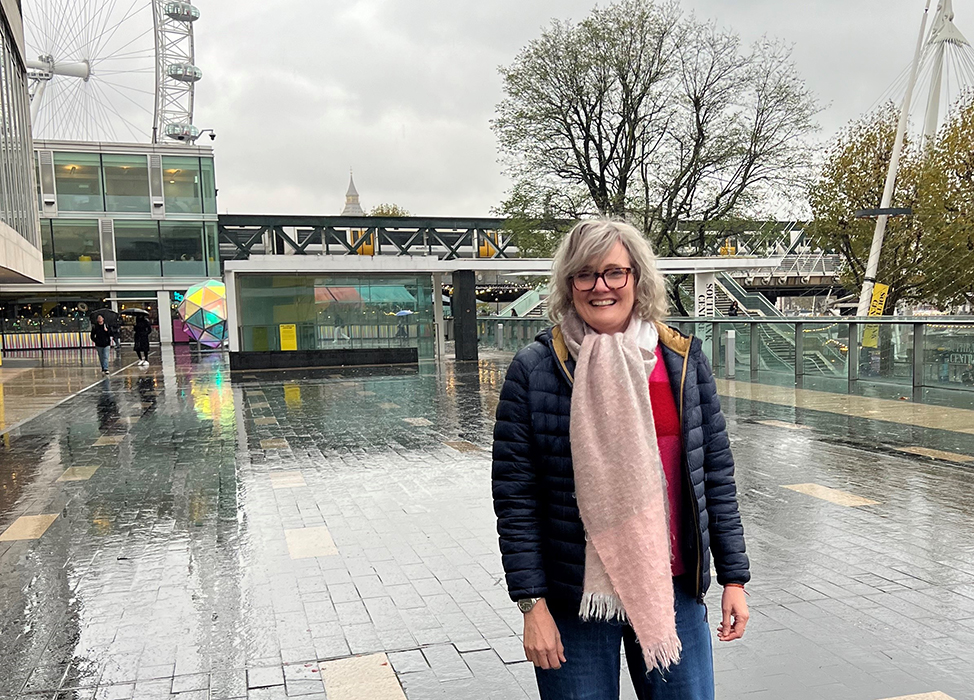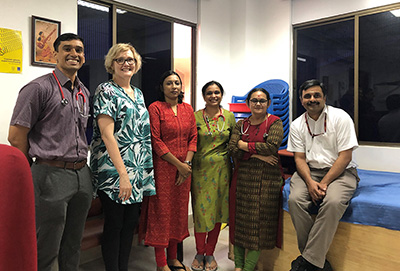05 December 2024
With combined passions for creativity and science, UniSA alum Anne Gordon is now helping to deliver England’s National Health Service New Hospital Program.

Dr Anne Gordon
Clinical Innovation Research Lead, NHS New Hospital Program
Bachelor of Applied Science (Occupational Therapy)
“I just feel like I have two halves of my brain. I have two identities, in a sense,” says Anne Gordon, who finds herself “constantly looking for opportunities to build the connectivity between the two”.
Anne was born in the Riverland town of Waikerie, grew up in nearby Cadell and came to Adelaide to study occupational therapy (OT) at UniSA antecedent institution, the South Australian Institute of Technology.
Although her mother, a teacher, advised against it (“she didn’t think the education department was for me!”), Anne applied for both teaching and OT, and after a six-week exchange to Pennsylvania at the end of Year 12, joined a cohort of 30, mostly female, OT students.
Anne speaks highly of her training, particularly the access they were afforded to the University of Adelaide. “Lecturers from the medical school were teaching us anatomy, physiology; we did neuroanatomy with the dentists.” By the end of her course, training sessions which gave the students exposure to how professions might work together and understand each other gave Anne an insight into the benefits of collaboration.
She also has happy memories of her OT placements, including some time in Darwin. “Those experiences have stayed with me forever; they’ve influenced my choices around specialisation, and I learned a lot about communication with people. Very early on I realised how fortunate I was; the things that carers of my patients, who are often small children, share is extraordinary. But that’s how you build intimacy and trust. That’s how you help people through the psychological aspects of what they’re dealing with in terms of their health and wellbeing.”
By this time Anne had been bitten by the travel bug and saw her qualification as her ticket to explore the world. Arriving in the United Kingdom, Anne sought out opportunities for training, partly due to a thirst for knowledge and partly to find out if OT really was for her. Seizing every opportunity, she continued her training, undertook some postgraduate teaching and found herself based in London. “I’ve mainly stayed in the statutory healthcare setting, but I’ve always had an interest in allied things.” At Great Ormond Street Hospital, she established their neurosciences service and completed a Masters in Health Psychology at the University of Westminster. “This was my motivation to ask how we evaluate health? How do we assess it? How do we know we’re making a difference?”

(Amrita Institute for Medical Sciences) Hospital in Cochin Kerala.
While undertaking research at the Institute of Child Health, part of University College, London, Anne was also travelling to Kenya to research babies exposed to infection at birth. Other research into a rehabilitation approach for children with a movement disorder led her to a PhD in children’s stroke at the University of Melbourne, while working at the Royal Children’s Hospital and National Stroke Research Institute in Melbourne. “Once I'd finished, it was a real privilege to supervise two PhD students who took my project and continued.” While completing her PhD, Anne was approached by Guy’s and St Thomas’ Hospital in London to set up their children’s stroke service and work as the lead for children’s occupational therapy services.
Back in London, Anne successfully lobbied Guy’s and St Thomas’ to establish a Chief of Allied Health and Psychology Services for children’s hospital and community services, eventually filling that role herself. While leading 430 people across both the community and hospital service, she still found time to volunteer in India. “I have always been interested in working in resource poor settings where your assumptions and skills get challenged. I’ve worked closely with a neonatal unit by training unqualified people to provide support to babies and caregivers, and establish an outcomes database to drive up service standards and research potential.”
When COVID-19 hit Anne was approached by the National Health Service (NHS) to help set up paediatric long covid service for Greater London. This led to taking on the first National Children’s Allied Health Professional Lead for Children and Young People for NHs England and then her current role as Clinical Innovation Research Lead for the NHS New Hospital Program.
Faced with ageing Victorian real estate, and the compromised building practices of the 1980s, such as aerated concrete, England has bold plans to build more than 20 hospitals in the next 10 years. Anne is part of the Healthcare Innovation team working on “the biggest capital funded program ever”.
“Basically, a clinical team colleague come to me with a challenge, and I looked at the evidence that exists and who we need to wrap around this, from commercial, from industry, from within the program, from within the hospitals that have already tried to make those changes and learn from them and then approach it.” Funds have also been allocated towards research that can help support answering these questions and ultimately inform a standard approach across all hospitals.
Along the way, Anne fostered her interest in people by training as a medical mediator, a concept borrowed from the legal profession which seeks to resolve issues between families and medical staff. Anne became more interested in the issue of inter-staff conflict and today she is an executive coach, specialising in delivering interactive learning in location and evaluating the benefits to the organisation and the individual.
She is also collaborating with colleagues from Oxford University in delivering evidence informed leadership training for aspiring leaders in healthcare settings. Anne’s lifelong passion for finding the question, approaching it systematically and finding the best available evidence-based answer has stood her in good stead in all her pursuits.
“Now I'm at the point in my career where I can be more flexible, and maybe do two things in two different countries. I don't have as much need for being in the one place and growing my career. I would ultimately like to have more of a portfolio career bringing together my clinical, operational, strategic and research experience.” Never one to back down from a challenge, it will be interesting to watch Anne’s next steps.




